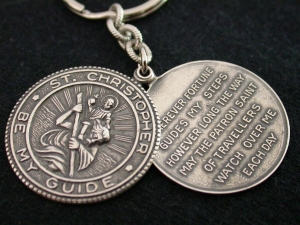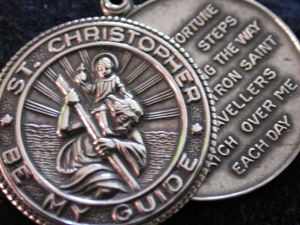The Definition of Chalcedon (451) We, then, following the holy Fathers, all with one consent, teach men to confess one and the same Son, our Lord Jesus Christ, the same perfect in Godhead and also perfect in manhood; truly God and truly . . . Continue reading →
Mediator
Canonization, Saints, And Christ Our Only Mediator
The AP ran a story yesterday on the naming of seven new Roman “saints.” According to the story, “Two of the new saints were Americans: Kateri Tekakwitha, the first Native American saint from the U.S., and Mother Marianne Cope, a 19th century . . . Continue reading →
Office Hours: Dennis Johnson on Hebrews 2:1-13
Dennis Johnson is back in the studio for Office Hours to discuss Hebrews 2:1–13. Dennis is Professor of Practical Theology at Westminster Seminary California. In this episode Dennis and I discussed the what it means to have a true human mediator representing believers . . . Continue reading →
Not A Ladder But A Cross
“17. Why must he also be true God? That by the power of His Godhead He might bear in His manhood the burden of God’s wrath, and so obtain for and restore to us righteousness and life.” Almost from the beginning of . . . Continue reading →
Machen: The Key Verse Of Galatians
“I do not make void the grace of God; for if righteousness is through the law, then Christ died in vain” (Galatians 2:21) “I do not make void the grace of God,” says Paul in concluding the report of his speech to . . . Continue reading →
Christ’s Intercession As Our Surety
This intercession consists of various acts. (1) The appearing of Christ for us by which he places himself before God the father as the only satisfier for our sins, representing the blood once shall (i.e., The merit of his death) and asking . . . Continue reading →
Heidelberg 29–30: No Other Name (3): All Or Nothing
Since the garden humans have faced the temptation to listen to an authority claiming to compete with God’s authority. Since the beginning voices have questioned, “has God really said?” Since the beginning voices have raised doubts about whether there is really one . . . Continue reading →
Honoring But Not Venerating
Obj. 1. The saints, on account of their virtues, are to be honored with the worship either of adoration (λατρεια) or of veneration (δουλεια). But it is not in the former sense that they are to be worshipped; because this form of . . . Continue reading →
Heidelberg 36: Our Holy Mediator
When two people, social equals, are at odds with one another, the best thing to do is for one to approach the other to seek resolution and restoration. When, however, they do not have equal status, restoration becomes more complicated. When we . . . Continue reading →
Heidelberg 40: Why Did Jesus Have To Die? (1)
From a purely human point of view, from a historical point of view, from an intellectual point of view, there have been few historical figures as compelling and important as Jesus of Nazareth. Many regard him as a sort of Jewish Socrates, . . . Continue reading →
Heidelberg 49: The Benefits Of Christ’s Ascension (1)
Our sense of distance in the late-modern, ultra-high-tech world has changed dramatically. It was not that long ago that a long-distance telephone call was a major event. The pastor with whom I served, Norman Hoeflinger, served a congregation in a town where . . . Continue reading →
Liability, Inability, Inevitability, And, Incarnability
The following is a recent sermon (July 26, 2020), delivered in the Escondido United Reformed Church from Hebrews 10:1–18 and Lord’s Day 5 of the Heidelberg Catechism. The United Reformed Churches follow the ancient Christian pattern of meeting twice each Lord’s Day. . . . Continue reading →
Heidelcast 192: What Must A Christian Believe? (10): “Conceived By The Holy Spirit, Born Of The Virgin Mary”
This is episode 10 in the series, What Must A Christian Believe? In this episode we are considering the third article of the Apostles’ Creed. The late and apostate Episcopal Bishop, which apparently did not disqualify him from holding episcopal office in . . . Continue reading →
Obedient From All Eternity? 1 Corinthians 15:20–28 (Part 1)
Introduction
I will never forget that Sunday. I was about thirteen years old—or maybe a little younger. Continue reading
That He Might Bear In His Humanity
Already in the New Testament, the church faced one of its greatest and deadliest heresies: the denial of Jesus’ humanity. The Greeks had room for men becoming gods and human-like behavior by the gods, but they had no room for a God-Man. Continue reading →










